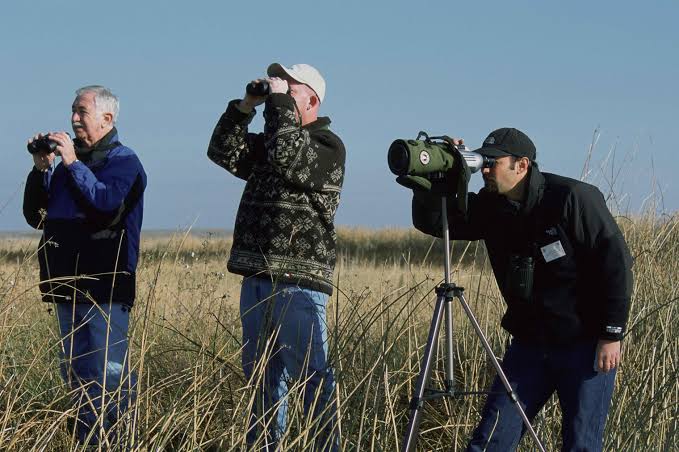Bird watching, according to Wikipedia, is a form of wildlife observation in which the observation of birds is a recreational activity or citizen science. Basically, the practice of observing birds in their natural environment as a hobby or for leisure. Nowadays, staunch and avid bird lovers cover miles to watch birds and discover new species they didn’t know about.

When you’re birding, “you’re almost in a different world,” said Heather Wolf, a bird guide for NYC Audubon in New York. It’s a skill of fine-tuned observation, which rewards the birder with a new perspective.
Looking for birds is all about patience, luck, and movement. To begin, let your eyes relax and look for movement. Always locate a bird first with your naked eye. The field of view through binoculars is much narrower, making it harder to search. Don’t look away when you first spot a bird and bring your binoculars up to your eyes. This ensures that you don’t lose sight of the winged wildlife.
Songs and calls are excellent identification mechanisms and sometimes the only way to distinguish them in the field by their calls; it is not uncommon to hear birds but not be able to find them. This takes a lot more practice than learning visual characters.
What is Ecotourism?
Ecotourism is a type of tourism involving visiting fragile, remote, undisturbed, natural areas rather than popular tourist spots. It also involves the protection and conservation of natural resources – the flora and fauna. It also aims to support the local people, tribes and wildlife. Since it brings in money, ecotourism is frequently seen as an incentive for protecting habitats and species.
With its rich diversity of avian life, bird-watching in India can be incredibly rewarding.
Bird Watching In An Affair With Ecotourism
 “Millions of birders around the world set out to catch a rare glimpse of plumage, a bold stroke of colour, or to hear an unusual song—and they’re changing the face of tourism,” stated Mr Brandon Withrow, a popular journalist in one of his recent articles.
“Millions of birders around the world set out to catch a rare glimpse of plumage, a bold stroke of colour, or to hear an unusual song—and they’re changing the face of tourism,” stated Mr Brandon Withrow, a popular journalist in one of his recent articles.
Many determined birders are ornithological nerds, compelled to travel long distances by their love of spotting a rare species. In fact, they are part of a growing multi-billion dollar ecotourism industry. Birding has become a part of a practical global conservation effort to help both birds and humans thrive.
Birding ecotourists have a lighter carbon footprint than others. Since birders only love to watch and study, they work to protect natural habitats and wildlife. You only need binoculars and pay attention to the life that develops around you. Bird watching routes take place in natural locations where the landscape plays a crucial role as a habitat for the different birds of our territory.
Birding ecotourism will help smaller economies where natural habitat is conserved. As lush green parks give way to migratory birds to settle there, tourism will get a boost. Lodges, hotels, food industry, everything will step up. An increasing number of tourists will require cab drivers, waiters, tour guides – a potent source of income.
To attract birds, specific plants and trees are planted by locals. Bird sanctuary and bio reserves play a key role.
One of the great appeals of bird-watching is that it is an inexpensive activity. Basic equipment includes binoculars, a book or internet to aid identification, and a notebook for recording the time and place of sightings.
If you come across an injured bird, do not touch. Do not litter the birds’ habitat. Many bird-watchers set up feeding stations to attract birds. The list of bird observations compiled by members of local bird-watching societies is very useful to scientists in determining dispersal, habitat, and migration patterns of the various species. Stay at small locally run lodges, deep in the heart of nature, where you can spot birdlife from the comfort of your accommodation.
Popular Birding Destinations In India:
1.Keoladeo Ghana National Park, Rajasthan
2.Manglajodi, Odisha
3.Ranganathittu Bird Sanctuary, Odisha
4.Binsar Wildlife Sanctuary, Uttarakhand
5.Sultanpur National Park, Haryana
The stance of the United Nations on Bird Watching:
 “Bird-watching, a popular hobby around the world, can present significant economic opportunities for countries through sustainable tourism,” stated the United Nations environment agency. It pressed that States should increase efforts to support this growing industry.
“Bird-watching, a popular hobby around the world, can present significant economic opportunities for countries through sustainable tourism,” stated the United Nations environment agency. It pressed that States should increase efforts to support this growing industry.
In the United States, for example, a survey by authorities puts the economic value generated every year by bird and other wildlife watchers at around $32 billion in that country alone.
Summary:
The activity of bird watching is one of the most popular options for followers of sustainable tourism. Ecotourists do not harm the environment and use fewer chemicals. Sustainable tourism must grow.
Every birdwatcher should plant a sapling every week wherever they find a beautiful form of life. In fact, every tourist should work to take care of nature. Less use of plastic, less wastage of water, less use of chemicals, helping the local people than brands, these are all good steps which should be taken.
Blog | About Us | Instagram | Gallery | Work With Us | Contact Us | Store


